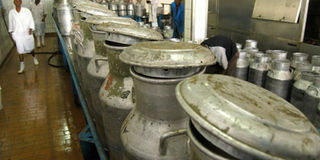Milk supply glut and overstretched processors push farmers to the brink

Staff of New KCC, Kiganjo Plant. The privilege enjoyed by big dairy firms to dictate milk prices for farmers in the county could soon end after the farmers resolved to form a County Dairy Federation to negotiate rates. PHOTO | FILE | NATION MEDIA GROUP
What you need to know:
The situation is similar in neighbouring Uganda.
The situation is expected to get worse with the onset of the long rains which is expected to further increase milk production.
New Kenya Co-operative Creameries and Brookside, with a nationwide milk collection structure, are the most affected by the surge in milk production.
The recent rainy season that continued to early February has triggered an oversupply of milk.
The surge in milk production has stretched milk processors with more farmers delivering milk while the powdered milk market remains unchanged. The situation is similar in neighbouring Uganda.
New Kenya Co-operative Creameries Board Chairman Matu Wamae said the milk glut is expected to last through to April and has seen processors hold more than 5,000 metric tonnes of powdered milk.
“Milk supply has been very high while the consumption remains constant; we are also unable to export to Uganda since we have higher prices driven by higher costs of production. Our Tanzania market is now receiving supplies from South Africa and so we have a huge stock of powdered milk. It is hard for the sector since we also have to protect the farmers,” Mr Wamae said.
The situation is expected to get worse with the onset of the long rains which is expected to further increase milk production.
New Kenya Co-operative Creameries and Brookside, with a nationwide milk collection structure, are the most affected by the surge in milk production.
INCENTIVES
Kenya Dairy Board acting Managing Director Humphrey Maina said the regulator would lobby the government to initiate incentives to protect farmers.
“The market situation could get worse when the rains come. The processors could quietly stop collecting milk on some days leading to losses,” warned Mr Maina.
The last time the country experienced a milk glut in 2011, farmers incurred huge losses.
Last week, players from the industry met Cabinet Secretary for Agriculture Willy Bett where they urged the government to release the Sh600 million fund for strategic food reserve to buy part of the stocks the processors were holding.
Mr Wamae said the strategic food reserve has been accommodated through amendments to the Dairy Act, but funds have not been released.





